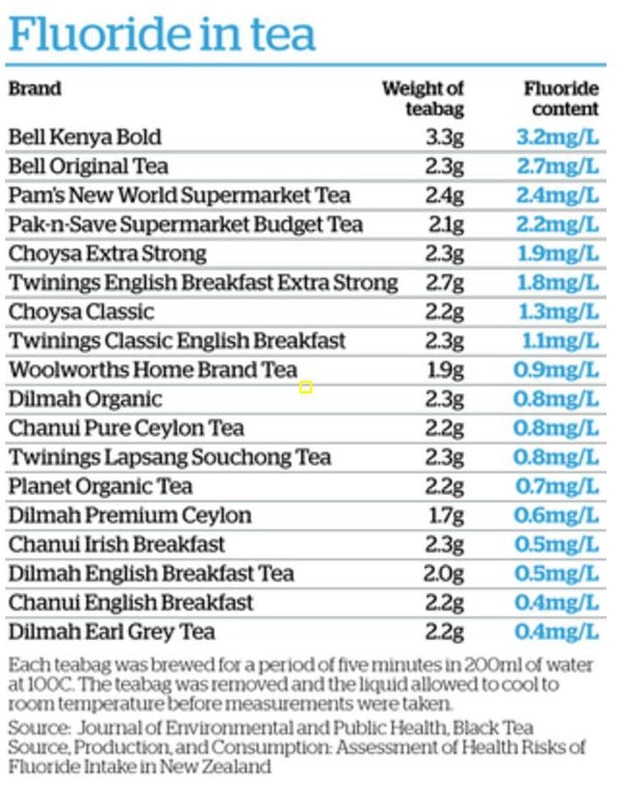Brands of black tea popular among Kiwis contain three times more fluoride than fluoridated tap water – but an expert says tea drinkers have nothing to be concerned about.
A study published in the Journal of Environmental and Public Health found Bell Kenya Gold tea had the highest amount of fluoride with 3.2mg/L when made with non-fluoridated water, followed closely by Bell Original tea which had 2.7mg/L.
The Drinking-Water Standards for NZ (2008) set out a maximum acceptable fluoride value of 1.5 mg/L and recommended a target range of 0.7 to 1.0 mg/L.
The study tested 18 popular tea brands available in New Zealand by brewing them in 200ml of water and found fluoride amounts ranging from 3.2mg/L to 0.4mg/L.
Six brands exceeded the World Health Organisation’s 1.5mg/L maximum permissible limit for fluoride in drinking water. Made with fluoridated tap water, the level was even higher.
Co-author Dr Mike Godfrey warned that “among adults, musculoskeletal and chronic arthritic joint pain are the main long-term effects of overexposure to fluoride”.
But Associate Professor of preventive and restorative dentistry Jonathan Broadbent said it was a “storm in a teacup” and there was no need to switch off the kettle.

It was well known there was fluoride in tea and it was, in fact, one of the most important sources of the element, he said.
“Just like anything, you can have too much of it. If you were drinking 2L of tea per day, every day, as an ongoing thing you could well be reaching that upper limit but you’d be reaching your upper limit of other things as well,” Broadbent said.
“You’re not going to experience acute harm or anything like that. It’s more a concern if you are doing that day after day on a very long-term basis. Certainly there are cases of people who have poisoned themselves in terms of fluoride or caffeine or whatever, from drinking too much tea.
“Fluoride in tea is not a concern for people who drink tea at normal levels.”
Despite that, Godfrey believed it was a real concern and that we ought to be checking fluoride levels in the bone whenever any keen tea drinker with arthritis had a hip replacement. He said GPs ought to start questioning their arthritic patients as to their tea drinking habits and get them to stop using fluoridated toothpaste if the amount of fluoride in their urine was elevated.
Fluoride in tea
• It is reported that tea leaves contain 98 per cent of the fluoride of the whole plant, with the most accumulated in old leaves.
• Tea plants also readily absorb fluoride from the soil.
*Original article online at http://www.nzherald.co.nz/nz/news/article.cfm?c_id=1&objectid=11885876
